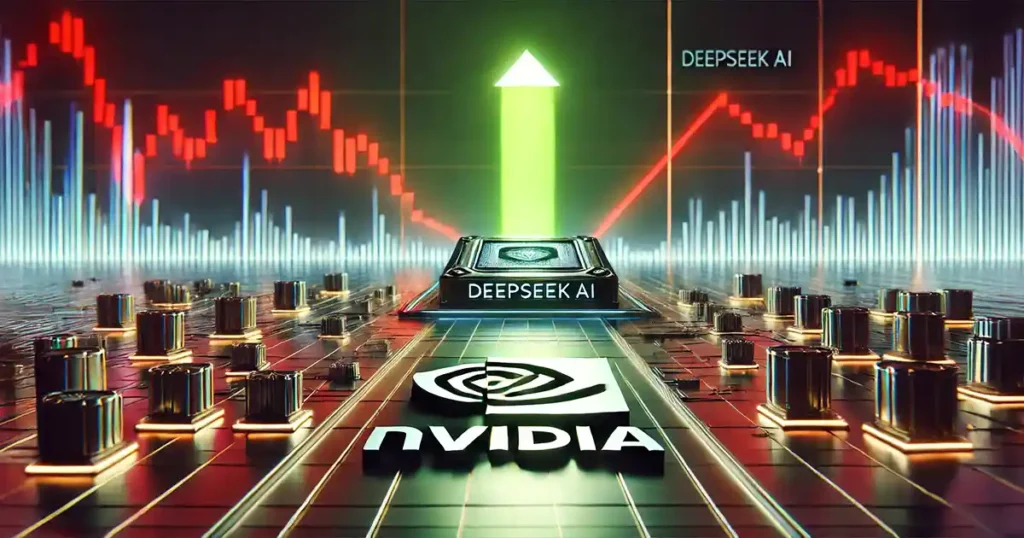Introduction
DeepSeek, a Chinese artificial intelligence startup, has been making waves in the global technology sector. With the introduction of a cost-effective AI model that competes with existing technologies, DeepSeek has challenged the established players in the industry and triggered significant market reactions. This article explores the reasons behind the recent declines in Nvidia and other tech stocks, looking into the implications of DeepSeek’s innovation on the broader market.
DeepSeek’s Disruptive Entry into the AI Landscape
DeepSeek has developed an AI model that equals the leading systems, but at one-tenth the price tag. This achievement has caused investors worry about the future demand of expensive hardware, traditionally demanded in developing AI, going forward. The efficiency of the model of DeepSeek implies the company and other firms would not have to spend much on costliest hardware and would possibly have lesser demand for those products by Nvidia.
Market Reactions: The Decline of Nvidia and Other Tech Stocks
DeepSeek’s announcement reduced the Nvidia stock by 17% and reduced its market value to $600 billion, making this the biggest loss incurred by any company in a single day. Other tech stocks, particularly those majorly invested in AI infrastructure and semiconductors, also declined significantly.
Investor Concerns: Reassessing the AI Investment Landscape
This development now weighs upon investors on how DeepSeek’s cost-effective AI model would imply for their spending cycle. Primarily, a reduction in high-performance hardware means a shift from the existing spending cycle on semiconductors, which had been driving much of the tech market rally so far. Heavy investors in AI infrastructure are forced to change strategy with the emergence of such technology.
Potential Shifts in the Tech Ecosystem
While hardware-focused companies face challenges, software companies who blend AI into their offerings will probably see benefits in DeepSeek’s innovation since the cost of carrying these models has decreased and access has become more widespread. Eventually, there is likely to be wider adoption of AI within industries, which would balance out any increasing demand for software solutions. Historical transitions in the tech industry have often seen a shift where value moved from hardware to software as technologies matured.
Analyst Perspectives: A Mixed Outlook
Market analysts have different views on the long-term implications of DeepSeek’s entry into the AI market. Some think that the efficiency improvements introduced by DeepSeek could eventually stimulate further AI consumption, which would benefit the tech industry as a whole. Others warn that the disruption to the existing hardware demand cycle could be problematic for companies that have built their business models around high-end AI infrastructure.
A key area of debate between analysts is whether DeepSeek’s model represents a short-term disruption or a long-term industry shift. Some believe that Nvidia and other semiconductor titans will find ways to adjust by optimizing their chips for newer AI workloads, thereby regaining their leading market position. On the other hand, if more companies emulate DeepSeek’s approach, demand for expensive AI-specific chips may decline sharply, forcing chipmakers to diversify their product lines or focus on alternative revenue streams.
Conclusion
The bigger question is: Will DeepSeek’s low-cost AI development model become the new standard, or will it be an outlier in an industry still reliant on high-end computational power? If the trend continues, we might see a huge redistribution of AI investments, with companies shifting their priorities toward software efficiency and cost-effective AI deployment. Ultimately, the impact of DeepSeek on Nvidia and the rest of the tech stock market points to how rapidly evolving AI technology can reshape the financial and technological landscape in unpredictable ways.
The technology industry has been definitely disrupted by the emergence of DeepSeek, compelling investors to rethink their investment strategies and business models. Though the immediate disruption is indeed tough for hardware-focused players like Nvidia, the ultimate consequence could be the landscape of AI becoming more democratized and more open to software innovation. Going forward from here, all the stakeholders will have to tread the changing landscape carefully in order to reap emerging opportunities.






